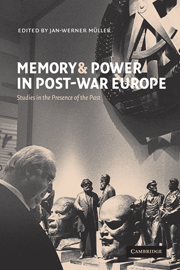Book contents
- Frontmatter
- Contents
- List of contributors
- Acknowledgements
- Introduction: the power of memory, the memory of power and the power over memory
- Part 1 Myth, memory and analogy in foreign policy
- 1 Memory of sovereignty and sovereignty over memory: Poland, Lithuania and Ukraine, 1939–1999
- 2 Myth, memory and policy in France since 1945
- 3 The power of memory and memories of power: the cultural parameters of German foreign policy-making since 1945
- 4 The past in the present: British imperial memories and the European question
- 5 Europe's post-Cold War remembrance of Russia: cui bono?
- 6 Memory, the media and NATO: information intervention in Bosnia-Hercegovina
- Part 2 Memory and power in domestic affairs
- Index
3 - The power of memory and memories of power: the cultural parameters of German foreign policy-making since 1945
Published online by Cambridge University Press: 22 September 2009
- Frontmatter
- Contents
- List of contributors
- Acknowledgements
- Introduction: the power of memory, the memory of power and the power over memory
- Part 1 Myth, memory and analogy in foreign policy
- 1 Memory of sovereignty and sovereignty over memory: Poland, Lithuania and Ukraine, 1939–1999
- 2 Myth, memory and policy in France since 1945
- 3 The power of memory and memories of power: the cultural parameters of German foreign policy-making since 1945
- 4 The past in the present: British imperial memories and the European question
- 5 Europe's post-Cold War remembrance of Russia: cui bono?
- 6 Memory, the media and NATO: information intervention in Bosnia-Hercegovina
- Part 2 Memory and power in domestic affairs
- Index
Summary
The study of post-1945 German foreign policy has been distinguished by the perennial debate between those experts who claim that the Federal Republic is on the brink of a major transformation in the way it approaches defence and national security, and other experts who insist with equal vehemence that the very little change is in the offing. At the core of this debate is the issue of German historical memory. To what extent have Germans learned lessons from their history? How deeply rooted are those memories in the institutions and collective consciousness of the nation? Even analysts who deny that such factors as memory or culture have any real causal force in world affairs typically sift through German debates over the past for evidence that a shift in behaviour is under way.
During the 1970s, for instance, many observers warned that Germany's pursuit of its own version of détente with the Soviet Union, Ostpolitik, signalled a return to the traditional German policy of balancing the East against the West and could lead to an unravelling of Germany's commitment to the Atlantic alliance. Defenders of the Brandt government, on the other hand, insisted that Ostpolitik represented an adjustment to the American policy of détente and an increased German willingness to live up to its responsibility to the victims of the Nazi regime, the majority of whom lived in Eastern Europe.
- Type
- Chapter
- Information
- Memory and Power in Post-War EuropeStudies in the Presence of the Past, pp. 76 - 99Publisher: Cambridge University PressPrint publication year: 2002
- 17
- Cited by



